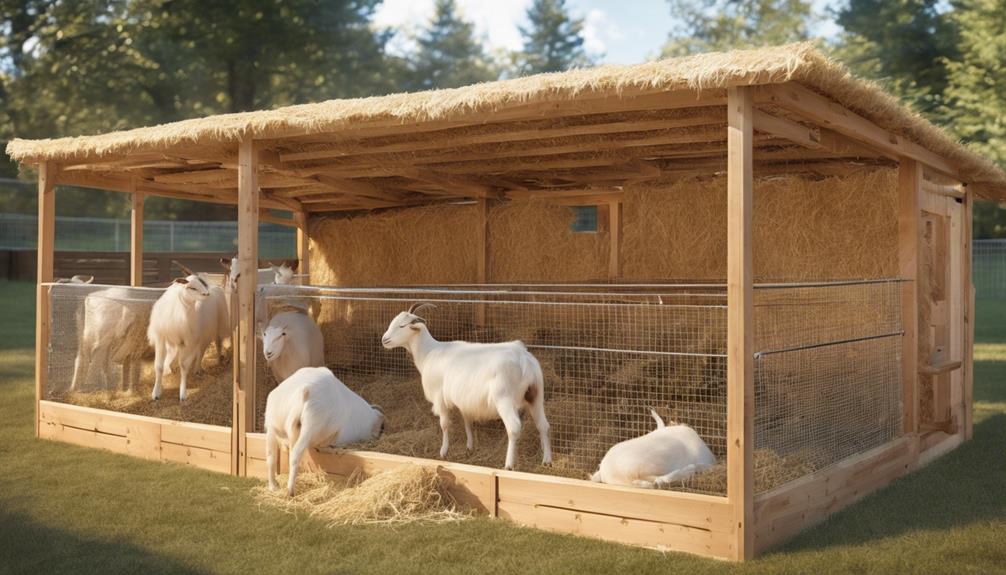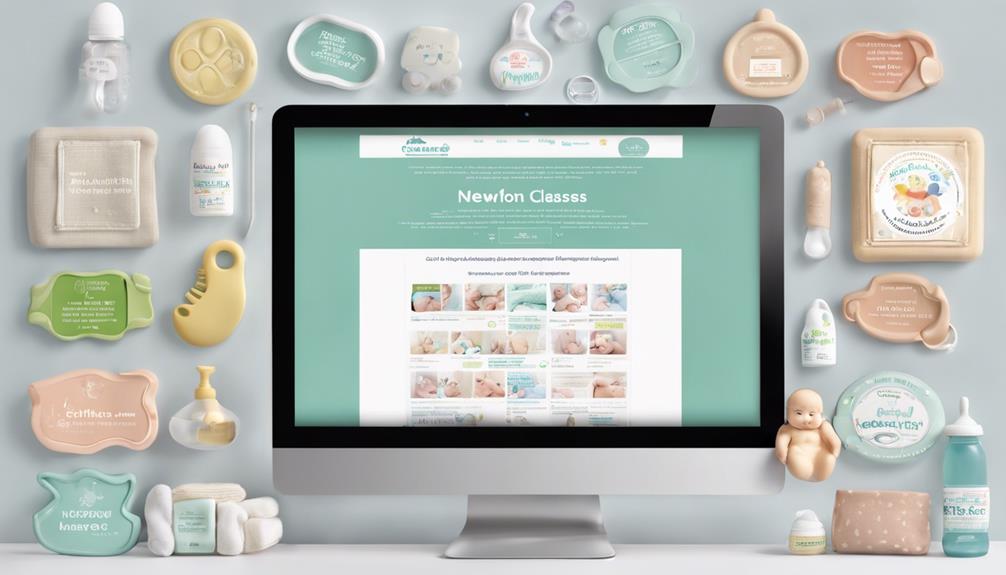Picture yourself gently leading baby goats as they take their first steps, envisioning a peaceful setting: a comfortable, inviting barn bathed in the gentle morning sunlight, accompanied by the delicate sound of small hooves lightly tapping on fresh straw.
The journey of nurturing these young souls requires patience, knowledge, and dedication. From ensuring proper nutrition to fostering strong bonds, each step in their early days shapes their future.
Let's explore the nuances of newborn goat care together, unraveling the secrets to raising happy and healthy kids.
Key Takeaways
- Provide colostrum for vital nutrients and antibodies.
- Maintain a warm, clean shelter for comfort and health.
- Monitor health closely for early detection of issues.
- Gradually transition to solid foods for proper development.
Newborn Goat Feeding Essentials
When caring for newborn goats, ensuring proper feeding is essential for their health and growth. Colostrum, the first milk produced by the mother goat, is vital for newborns as it provides essential nutrients and antibodies important for their development.
Bottle feeding colostrum to kids who may not have nursed well is a common practice to make sure they receive this important nutrition. As baby goats grow, it's important to introduce hay and grass around 2-4 weeks of age to start changing them to solid foods.
Water should be made available in a trough once the goats are a few weeks old to make sure proper hydration. Probiotics can also be beneficial during the weaning process to support their digestive health.
Additionally, providing a balanced diet of hay, pasture, and grain is important for the healthy growth of newborn goats. Making sure they receive the right nutrients from an early age sets the foundation for their overall well-being and development.
Housing and Environment Setup

For the best care and well-being of newborn goats, establishing a warm, draft-free shelter with clean bedding and proper ventilation is essential. Baby goats need a safe sanctuary to thrive, so guarantee the shelter provides at least 10 square feet per goat for comfort and movement.
It's important to keep the living area free of toxic plants that could harm the delicate newborns. Maintaining a hygienic environment is critical to prevent diseases and promote the health of the baby goats. Regularly inspect the pasture for any potential hazards or parasites that could affect the newborn goats' well-being.
A draft-free and warm environment is key to keeping the baby goats healthy and happy. By setting up a shelter with these considerations in mind, you create a nurturing space where the baby goats can grow and develop without unnecessary risks to their health.
Health Monitoring and Care Tips
To secure the ongoing well-being of newborn goats, a vigilant approach to health monitoring and care is essential in safeguarding their development and vitality.
Monitoring baby goats for signs of illness, such as lethargy, loss of appetite, or abnormal behavior, is necessary for early detection and treatment. Keeping track of weight gain and growth development helps assess overall health.
Regular inspections for lice and parasites are required to prevent infestations. Providing a clean environment is key to reducing disease risks and promoting health.
Consulting a veterinarian for vaccinations, deworming schedules, and any health concerns guarantees proper care. It's important to feed newborn goats with high-quality milk, monitor their feed intake, and ensure they're growing at a healthy rate.
Bonding and Socialization Activities
Establishing a strong bond between newborn goats and their mother is important for fostering ideal development and well-being. This initial bond sets the foundation for a healthy relationship and promotes a sense of security in the newborn goats.
To further enhance socialization, encourage interactions with other goats to facilitate healthy relationships and herd integration. It's essential to monitor these interactions carefully, ensuring that playtime is positive and behavioral issues are addressed promptly.
Providing a safe environment for bonding and socialization activities is paramount. Supervise any introductions to new animals or environments to guarantee a positive experience for the newborn goats.
Transitioning to Solid Foods
As newborn goats begin exploring solid foods, their nutritional needs shift towards a more varied diet to support their growth and development. Shifting baby goats from milk to solid foods should be a gradual process. It's vital to monitor their milk intake and introduce solid foods slowly to aid in digestion and rumen development.
Providing loose goat minerals during this change is critical to make sure they receive the necessary nutrients for best growth. Offer a mix of hay, pasture, and limited grain to help their digestive system adjust to the new diet. Pay close attention to how the baby goats respond to the solid foods and adjust their feeding accordingly.
Properly changing to solid foods is a critical step in newborn care, as it sets the foundation for their overall health and well-being as they continue to grow.
Frequently Asked Questions
How Can I Train My Newborn Goat to Use a Litter Box?
We've found that training newborn goats to use a litter box can be challenging but rewarding. Start by placing the box in their living area, and gently guide them towards it after meals. Consistency is key!
What Are Some Common Behavioral Issues Newborn Goats May Exhibit and How Can I Address Them?
Newborn goats may display behaviors like nipping, jumping, or excessive crying. We address these by providing proper socialization, gentle correction, and ensuring their needs are met. Consistent training and positive reinforcement are key.
Can Newborn Goats Be Trained to Walk on a Leash?
Absolutely, newborn goats can be trained to walk on a leash. It's a gradual process that involves patience, positive reinforcement, and starting with short sessions. Consistent training and gentle guidance help them learn to walk calmly on a leash.
Are There Specific Toys or Enrichment Activities That Are Beneficial for Newborn Goats?
We've found that providing newborn goats with toys like balls, branches, and even empty boxes can be beneficial. Enrichment activities such as obstacle courses and interactive feeders help keep them mentally stimulated and physically active.
How Can I Prevent My Newborn Goat From Developing Separation Anxiety?
To prevent newborn goat separation anxiety, we gently introduce them to short separations, gradually increasing time apart. Providing companionship, toys, and a cozy environment helps them feel secure. Consistent routines and positive reinforcement build trust and confidence.
Conclusion
To summarize, proper care and attention during the critical newborn stage are key to ensuring the health and well-being of baby goats.
Did you know that newborn goats have a remarkable ability to stand and walk within minutes of being born? This impressive instinct helps them bond with their mother and navigate their new environment with ease.
Remember, providing a nurturing and supportive environment is essential for the development of these resilient young animals.









